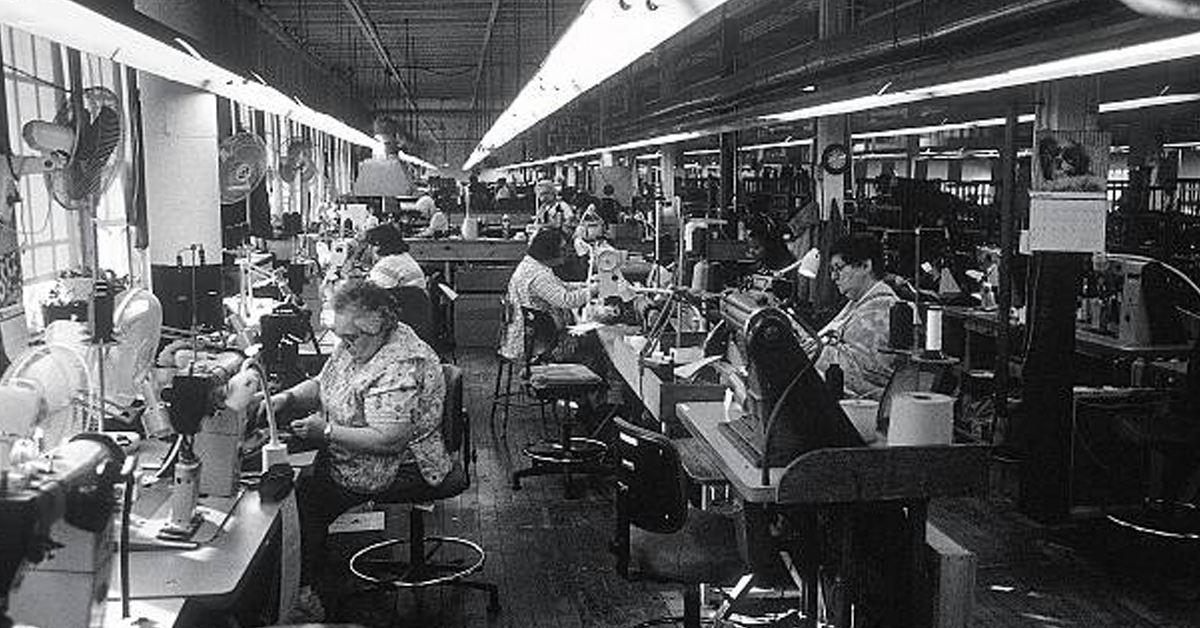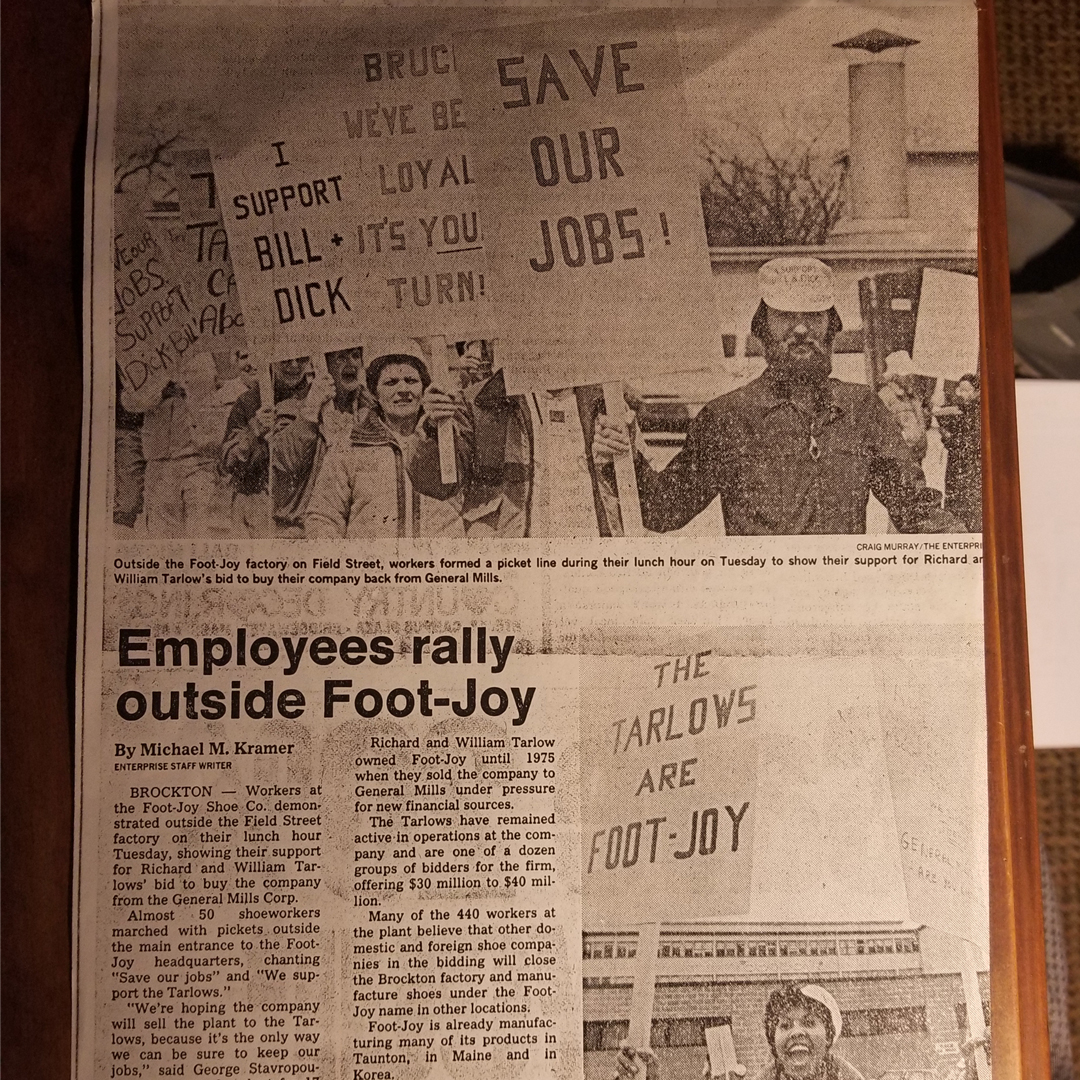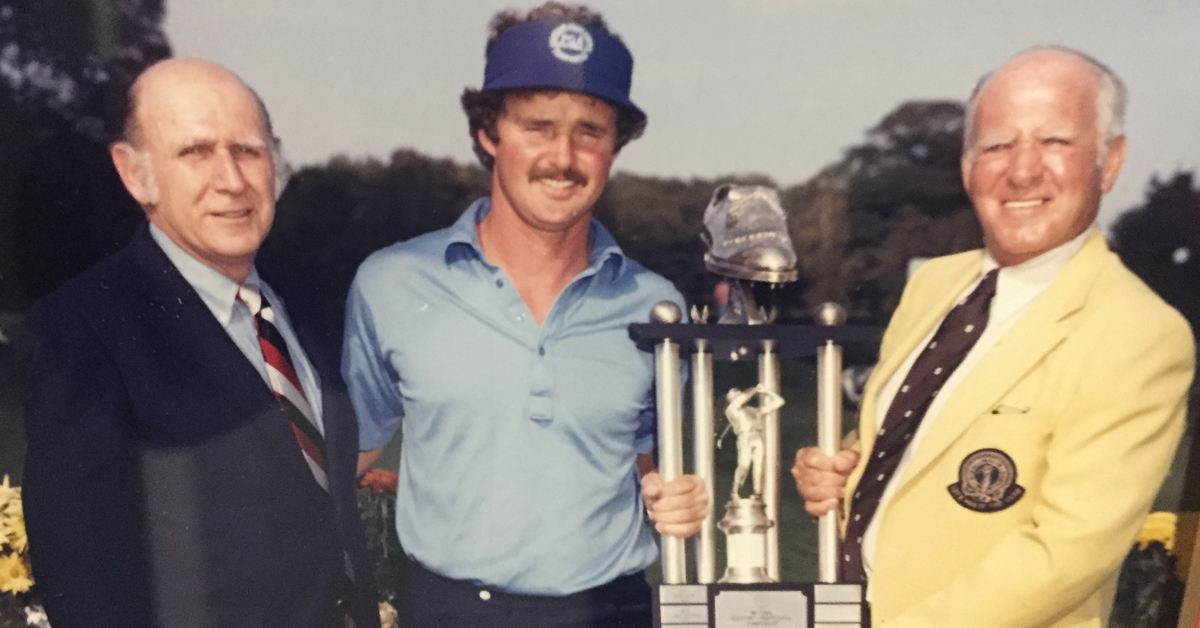William E. “Bill” Tarlow once said that making shoes in his hometown of Brockton was in his blood.
He and his late brother Richard Tarlow co-owned the company that produced world-famous FootJoy golf shoes from 1957 and 1975. By the time they took over production, FootJoy was sold in 48 states and two-thirds of all pro shops nationwide.
However, Tarlow was even more widely respected for his vast knowledge, compassion and giving back to the community — often by donating shoes. He fostered mutual respect with his employees, acknowledging all of them on a first-name basis, and built devoted friendships on the golf course and in the community that lasted a lifetime.
Tarlow died peacefully and comfortably, with his family at his side, this past Thanksgiving (November 26) at Springhouse in Jamaica Plain. He was 94. He is survived by his sons Steven Tarlow and Dan Tarlow, daughter Ellen Tarlow, four grandchildren and a great-granddaughter.
“Billy was a great man and someone I’m glad I got to spend some time with during my 25 years at the club,” said Peter Norton, former head golf professional at Thorny Lea Golf Club in Brockton.
QUICK LINKS: OBITUARY | FOOTJOY STATEMENT | FOOTJOY TIMELINE | MASS GOLF HOME

Growing up in Brockton, Tarlow learned golf and shoemaking from his father, a Russian immigrant. His father co-owned a shoe company, Stone and Tarlow, and introduced Bill to the game at a young age.
Tarlow also developed into an accomplished golfer, winning Albemarle Golf Club’s Junior Open in 1943 and the Brockton City Four-Ball with John Gorman in 1947. As a longtime member of both Thorny Lea and Stockbridge Golf Club, he was a student of the game, and as he got older became insistent on helping others with the golf swing.
After serving in the Navy, he was captain of the Dartmouth College golf team (Class of 1950), and he graduated from Harvard Law School in 1953.
Instead of pursuing a legal career, though, Tarlow joined Stone and Tarlow where his brother was already working. In 1957, Stone and Tarlow purchased the Field and Flint Company, where FootJoy shoes were first created. The company was renamed Brockton Footwear Inc. before becoming Foot-Joy, Inc. in 1970.
In 1959, all of Field and Flint’s production was moved to the Stone and Tarlow factory on Field St., which manufactured the FootJoy “Classics” line all the way up until 2009. Until its final days in Brockton, Tarlow made sure each pair of FootJoy shoes continued to use high-quality materials, such as calf leather, and were manufactured to the highest degree.
Tarlow thoroughly embraced a career of hustling across the wooden planks of the old Brockton plant, surrounded by the rich scent of leather, the loud heavy machinery, and the view of hundreds of workers going through the process of making some of the best shoes that have ever come out of Massachusetts.
“Bill made it 94 years, and I contend that it was because of him walking up and down four flights of stairs, probably 50 times a day,” said Jack Erickson, who worked at FootJoy and become one of Tarlow’s closest and lifelong friends. “He knew every single person’s name. And he knew what they were doing. He knew how they did it. He knew how to make a shoe as good as anybody that worked. And it was just, it was so impressive. And he was so passionate about it.”
***
Shoemaking in Brockton dates all the way back to 1857, and Tarlow helped shape the future of FootJoy and provided customers with shoes that were treasured by those who wore them.
When the Tarlow family acquired FootJoy, they decided to go all-in by specializing in golf shoes, projecting that golf would grow in the mid-20th century. They were right. Millions took up golf inspired by U.S. Presidents Dwight D. Eisenhower and John F. Kennedy, and the spectacular feats of Arnold Palmer. Between 1957-1990, the number of golf courses in the U.S. increased from 5,000 to 14,000.
Therefore, their mission became expanding their dominant brand by offering more fashions, price ranges and colors, and shoes that could fit anybody.
He perfected the Goodyear welt construction process, an old-school technique that requires a leather welt to be stitched to the upper sole. In total, there were 165 steps to making a pair of FootJoy Classics. Erickson said one of their proudest achievements was developing a waterproof welted shoe that could withstand the elements.
They also continued making street shoes, including the popular alligator-skin shoe. Red Sox legend Jim Rice used to come to the factory directly and buy pairs of alligator shoes, according to Dan Tarlow.
VIEW: FOOTJOY CATALOG FROM 1970
Tarlow’s sons both worked for FootJoy in their youth and remember there being hundreds of lasts, the wooden form that a shoe is built around, that could be customized to anybody’s foot.
“They had lasts for individuals who had some either slight oddity in their foot and including a lot of golf pros and even sumo wrestlers, who had short, very wide feet,” Dan Tarlow said.
While most professional golfers today have shoe endorsement deals, Tarlow never had to pay a cent for the players to wear them. The quality spoke for itself.
“FootJoys from Brockton, they lasted as long as you kept them,” said Brockton’s John Hadges, a Thorny Lea member and two-time Massachusetts Amateur champion.
Tarlow also got to meet the always-curious Walter Hagen before his death in 1969. Hagen followed Tarlow all around the factory, asking about his upbringing and all the parts of the operation.
“This is consistent with Walter Hagen’s philosophy of curiosity and finding out what’s going on around you,” Dan Tarlow said. “That was one of [my father’s] favorite stories about golf pros is coming to FootJoy.”
***
At its height, the Brockton factory had about 500 employees, including 300 manufacturers, and produced thousands of shoes per day.

“I never lost a skilled employee,” Tarlow once told the Boston Globe proudly. “Nobody.”
“I think that people who work for him loved him,” Dan Tarlow said. “He spent a lot of time on the factory floor walking. He was a great believer in management by walking around.”
For decades, workers in the FootJoy Plant in Brockton walked under a sign that read “Through These Halls Pass The Best Shoemakers In The World.”
VIEW: FOOTJOY INNOVATIONS & MILESTONES (THROUGH 1990)
But before anybody walked through these halls each day, Tarlow made it a point to get there before sunrise with those shoemakers in mind.
“In the summertime, he said he would get there by 4 a.m.,” Steve Tarlow recalls. “It could be baking in the summer, and in order to make sure that the workers were in a humane environment on the top floors, he would go in and open all the windows and turn on the fans, so it was livable.”
Before working alongside Tarlow, Erickson worked for a smaller shoe company and was convinced by Tarlow to come work for him, even if it meant taking a pay cut.
“He just said, you’re better off here,” Erickson recalled. “My wife and I decided to make the move, and I never looked back, and it was probably the best thing that ever happened to me at a professional level.”
His employees were especially loyal as the years went on. General Mills acquired full ownership of FootJoy in 1977, but less than a decade later was proposing to sell FootJoy. Employees picketed outside the plant, trying to encourage General Mills to sell the company back to the Tarlow family. While their efforts were appreciated, General Mills went on to sell FootJoy to the Acushnet Company in 1985, a move that Tarlow ended up believing was one of the best things to ever happen to the company.
Today, FootJoy maintains the moniker of #1 Shoe In Golf and #1 Glove in Golf.
Tarlow continued to take part in the production of the FootJoy Classic line in Brockton until he retired in early 2009. By then, almost all FootJoy manufacturing had moved to Achusnet’s factory in China. Today’s shoes are mass-produced and are much lighter and more affordable than those of yesteryear.
The Brockton plant was the only FootJoy one left in the U.S. After the plant closed in 2009, the line was discontinued. While disappointed at the plant’s closing, nobody could deny Tarlow’s indelible impact on the success of FootJoy. His artisan spirit remained for the rest of his life.

***
Fellow Brockton native Herbert Warren Wind, a famous sportswriter and inductee into the Mass Golf Hall of Fame, once referred to Tarlow as the best unpaid golf professional in America.
Though Tarlow didn’t get to play much golf while he owned FootJoy, he flocked back to the sport later in life. His impact was felt in many ways. Not only was he a talented golfer – he shot his age several times in his 80s – he was well-read on swing tips.
Hadges said he received books Tarlow used to read and took particular notice of the notes Tarlow made.
Up until his final years, he enjoyed spending time at the driving range at McGolf in Dedham, observing others and offering advice, regardless if somebody asked for them or not.
“Billy was a range rat,” said Thorny Lea Member Steve Tasho, a two-time Mass Amateur champion. “He’d be out there with his bucket hat on. He’d love it when you were practicing.”
“He was always working on a new swing weekly, and I enjoyed watching as he tinkered with his swing,” added Norton. “He was a pretty good striker of the ball. We also talked about putting a lot because he was unorthodox in that he played righty but putted lefty. I can’t tell you how many putters he went through, but I can tell you that I put lots of grips on those putters.”
Tarlow’s contribution to the sport also lives on through two events that still exist today.
He organized the first-ever Assistant PGA Professional Championship, which started in 1977 and was held annually at Thorny Lea every year until 1990. He worked behind the scenes to get the professionals to come out for a week with their families to enjoy the Boston area and competition at a high level.
As was the custom of Brockton area events, players received a gift package that would include at least one pair of FootJoy shoes.

The tournament also helped launch the careers of future PGA TOUR champions.
“The players loved it,” Norton said. “Loren Roberts and Fred Funk both won there so that jump-started their careers, and they will say so. They speak very highly of the event and the Tarlows.”
Another event, the Tarlow Invitational, still occurs annually at Thorny Lea. After Richard Tarlow died in 1995, Thorny Lea members came together to form an invitational named after the Tarlow family. It still stands today as one of the most competitive regional events in Massachusetts for both male and female amateurs.
“Having both genders play in the event was very important to them,” Norton said.
Tarlow was also keen on helping behind the scenes, especially with individuals with disabilities. One of those individuals worked at Thorny Lea.
“This fellow had a very hard time simply walking,” Steve Tarlow recalls. “But he was a very determined guy. And my father spent years teaching him how to play. You could tell he really loved my father for all the time and attention he had given him.
“When my dad moved to Boston,” he continued, “he used to come out early in the morning to Franklin Park and give lessons to a budding golfer he met at Boston’s downtown University Club, and there were a lot of people like that. That was my dad.”